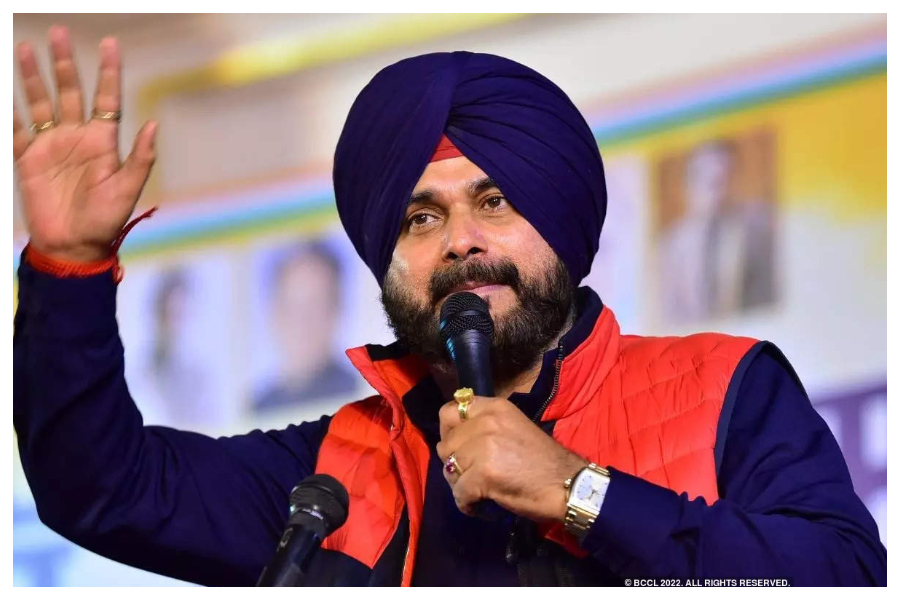Politics
1988 road rage case: SC sentences Navjot Singh Sidhu to one-year jail

In a setback to former Punjab Congress chief Navjot Singh Sidhu, the Supreme Court on Thursday sentenced him to one-year in jail in a 1988 road rage case.
A bench headed by Justice A.M. Khanwilkar allowed the review petition by the family of victim Gurnam Singh against the top court’s 2018 verdict, which let off Sidhu with a mere Rs 1,000 fine. The top court enhanced the sentence to Sidhu to one year.
The top court said, “We have allowed a review application on the issue of sentence…we impose a sentence of imprisonment of one year to be undergone by the respondent…” The order in the matter will be uploaded later in the day.
On March 25, the Supreme Court reserved the verdict on a review petition seeking a direction to enhance the sentence awarded to Sidhu in the 1988 road rage case.
Senior advocate A.M. Singhvi, representing Sidhu, submitted before a bench headed by Justice A.M. Khanwilkar that sentence was a discretion of court and no interference could be done except in cases of death penalty, given in rarest of the rare and in the present case, and added there was no need to have a relook at the 2018 judgment.
“Appeal on adequacy of sentence should not be entertained. The state is not in appeal against the sentence and the victim cannot challenge the adequacy,” submitted Singhvi. He further added that there has been no allegation of lack of cooperation on the part of his client.
The bench, also comprising Justice Sanjay Kishan Kaul, noted that the issue before it was only whether despite the court having issued limited notice on (point of) sentence the provision under which sentence has been imposed needs to be looked at.
The bench reserved the judgment after hearing detailed arguments in the matter. The plea was filed by the kin of the deceased, Gurnam Singh seeking a relook on the 2018 judgment.
Senior advocate Sidharth Luthra, representing the victim’s family, submitted that the death due to cardiac arrest is not correct, and a blow was delivered on the victim. Singhvi vehemently argued that it was extremely doubtful that an injury, caused by a fist blow, could have led to the death.
Luthra argued that the 2018 judgment failed to consider the previous decision in the case of Richhpal Singh Meena vs Ghasi (2014). He added that, in this case, the top court was of the view that when there is death of a human being, it may either be culpable homicide (amounting or not amounting to murder) or not culpable homicide.
National News
Mumbai civic polls: Thackeray cousins’ Marathi pride vs BJP-Shiv Sena’s global city vision

Mumbai, Jan 5: As the Brihanmumbai Municipal Corporation (BMC) elections scheduled for January 15 draw closer, the political contest for Mumbai has sharply intensified.
The Thackeray cousins — Uddhav Thackeray and MNS chief Raj Thackeray — on Sunday released a joint Vachan Nama (manifesto), signalling a rare show of unity. In response, the Bharatiya Janata Party (BJP) unveiled an “Aarop Patra” (charge sheet), alleging large-scale corruption during the Thackeray-led administration’s 25-year control of the BMC.
The Thackeray camp has framed the election around a “Save Democracy” narrative, alleging “vote theft” through unopposed victories and appealing to the idealism of young voters. In contrast, the BJP has launched digital “Aarop” campaigns portraying the existing BMC structure as outdated and corrupt, arguing that it obstructs Mumbai’s transformation into a “Global City” that the youth aspire to.
For the first time in nearly two decades, Shiv Sena (UBT) and the Maharashtra Navnirman Sena (MNS), along with the Nationalist Congress Party (Sharadchandra Pawar), have presented a unified vision for Mumbai under the slogan “Shabd Thackerencha” (word of the Thackerays).
Their manifesto includes a range of welfare promises such as the Swabhiman Nidhi — a monthly allowance of Rs 1,500 for domestic workers and Koli women — construction of one lakh affordable homes within five years, the creation of a dedicated BMC Housing Authority, 100 units of free electricity for residential users through BEST, subsidised meals at Rs 10 for breakfast and lunch, reduction of minimum bus fare to Rs 5, employment allowance and interest-free loans for gig workers, and the establishment of five new medical colleges.
The Vachan Nama also explicitly calls for a “Marathi Mayor” and asserts that Mumbai’s land should primarily be reserved for “Mumbaikars.”
Meanwhile, the BJP’s Aarop Patra alleges a corruption scam amounting to Rs 3 lakh crore over the past 25 years of Thackeray-led governance in the BMC. The party claimed that despite spending Rs 21,000 crore on road construction over a decade, Mumbai continues to suffer from severe pothole issues.
The BJP further alleged irregularities during the COVID-19 pandemic, including the so-called “Body Bag Scam,” where body bags were allegedly procured at Rs 6,721 each despite costing around Rs 1,500, and discrepancies in oxygen plant installations worth Rs 320 crore. It also claimed that approximately 1,700 bar and restaurant owners were subjected to extortion during the Maha Vikas Aghadi tenure.
The BJP accused the Thackeray camp of insincere commitment to the Marathi language, citing a 70 per cent decline in Marathi-medium students and the closure of 114 BMC-run Marathi schools.
While the Thackeray cousins emphasise “Marathi pride,” the BJP maintains that major infrastructure projects such as the Coastal Road and Mumbai Metro were completed only due to the efforts of Chief Minister Devendra Fadnavis and the Centre.
Political observers note that the Thackerays try to build a combined appeal of “social security” and “identity.” By promising a Marathi Mayor and asserting Mumbaikar rights over land, they aim to consolidate the traditional nativist vote that weakened after the Shiv Sena split.
The reunion of Thackerays has also created a strong visual and emotional impact, projecting a “united family” image intended to counter the BJP’s organisational strength. Welfare promises, including free electricity and subsidised meals, are seen as key strategies to attract slum dwellers and chawl residents.
Observers argue that the BJP’s charge sheet strategy is designed to focus on “performance and accountability,” targeting the tax-paying middle class by alleging misuse of public funds under the previous regime. The party is positioning itself as the only force capable of modernising Mumbai, highlighting the rapid execution of infrastructure projects under the current Mahayuti government while contrasting them with what it describes as “25 years of failure.”
Crime
Mumbai: Govandi Resident Booked For Submitting Forged Birth Certificate With Passport Application Amid M-East Ward Scam Probe

Mumbai: Even as Deonar police continue their investigation into the alleged registration of 106 fake birth records in Mumbai Municipal Corporation’s M East Ward, another case involving a forged birth certificate has come to light. A separate offence has been registered against Govandi resident Fahed Abdul Salam Sheikh for allegedly submitting a fake birth certificate along with his passport application.
According to the FIR, Police Constable Vitthal Yashwant Bakle, who is attached to the passport verification cell at the Deonar police station, lodged the complaint. Sheikh’s passport application, dated June 3, 2025, was received at the police station on July 14, 2025. The applicant is a resident of Flat No. 2206, B Wing, Centrio Building, Waman Tukaram Patil Marg, Govandi.
As part of the verification process, Bakle visited the address mentioned in the application. On July 24, Sheikh personally appeared at the police station with his documents for verification. His birth certificate was subsequently sent for authenticity verification to the issuing authority the office of the Health Officer, Kalaburagi City Corporation, Jagat Circle, Main Road, Kalaburagi, Karnataka.
During a field inquiry conducted by the Deonar police in Kalaburagi, the Registrar of Births and Deaths, Kalaburagi Municipal Corporation, informed the police through a letter dated December 9 that no record of Sheikh’s birth certificate dated April 15, 1993 was found in official registers. This confirmed that the birth certificate submitted during passport verification was forged.
Based on these findings, the Deonar police have registered a case against Fahed Sheikh under relevant sections of the Bharatiya Nyaya Sanhita (BNS) Act, and the Passport Act, and further investigation is underway.
Crime
Mumbai: Ex-Hari Media Network Manager, Associates Booked For ₹1.41 Crore Scam Using Forged Athiya Shetty Signature

Mumbai: The Amboli police have booked three individuals for allegedly embezzling Rs 1.41 crore from Hari Media Network Private Limited through a series of fake projects and forged documents. The accused are Rishbh Sureka, a former senior manager–client servicing (influencer marketing) at the company, Yash Nagarkoti, CEO of Hooray Movies, and Ashay Shastri.
Sureka is accused of forging actress Athiya Shetty’s signature and creating a fake email ID in the name of actor Arshad Warsi to execute the fraud. Hari Media Network, which provides advertising and marketing services, has its head office in Haryana and a branch in Andheri West, Mumbai, opposite Yash Raj Films. Sureka joined in July 2023 and was authorised to handle influencer branding, project coordination, and communications with the finance team and CEO.
Soon after joining, Sureka received an interest-free loan of Rs 15 lakh from the company for his mother’s medical treatment. The fraud came to light through multiple fake invoices. In August 2024, Sureka claimed a Havells project featuring actress Dia Mirza required Rs31 lakh for Hooray Movies, which was approved. He allegedly told Nagarkoti the payment would be Rs 62 lakh.
After completion, Nagarkoti withheld the video and demanded the extra amount, citing a forged email from Sureka. The company paid an additional Rs 19 lakh to release the video. Investigations revealed Sureka, Nagarkoti, and Shastri conspired to submit forged bills in the names of brands like Havells, Mahindra Lifespaces, Realme Number Series, and Birla Estates. These fake claims totalled over Rs 52 lakh, transferred to Sureka’s personal account.
In January 2024, Sureka misused the company’s email to approach Matrix Entertainment, Athiya Shetty’s talent managers, and independently secured a Rs40 lakh advertisement with Khanna Jewellers. He forged Shetty’s signature on a fake agreement, collected Rs15 lakh from the jeweller, and did not pass it to Matrix. He also created a fake Zomato invoice involving Shetty and cricketer KL Rahul.
-

 Crime3 years ago
Crime3 years agoClass 10 student jumps to death in Jaipur
-

 Maharashtra1 year ago
Maharashtra1 year agoMumbai Local Train Update: Central Railway’s New Timetable Comes Into Effect; Check Full List Of Revised Timings & Stations
-

 Maharashtra1 year ago
Maharashtra1 year agoMumbai To Go Toll-Free Tonight! Maharashtra Govt Announces Complete Toll Waiver For Light Motor Vehicles At All 5 Entry Points Of City
-

 Maharashtra1 year ago
Maharashtra1 year agoFalse photo of Imtiaz Jaleel’s rally, exposing the fooling conspiracy
-

 National News1 year ago
National News1 year agoMinistry of Railways rolls out Special Drive 4.0 with focus on digitisation, cleanliness, inclusiveness and grievance redressal
-

 Maharashtra1 year ago
Maharashtra1 year agoMaharashtra Elections 2024: Mumbai Metro & BEST Services Extended Till Midnight On Voting Day
-

 National News1 year ago
National News1 year agoJ&K: 4 Jawans Killed, 28 Injured After Bus Carrying BSF Personnel For Poll Duty Falls Into Gorge In Budgam; Terrifying Visuals Surface
-

 Crime1 year ago
Crime1 year agoBaba Siddique Murder: Mumbai Police Unable To Get Lawrence Bishnoi Custody Due To Home Ministry Order, Says Report


















